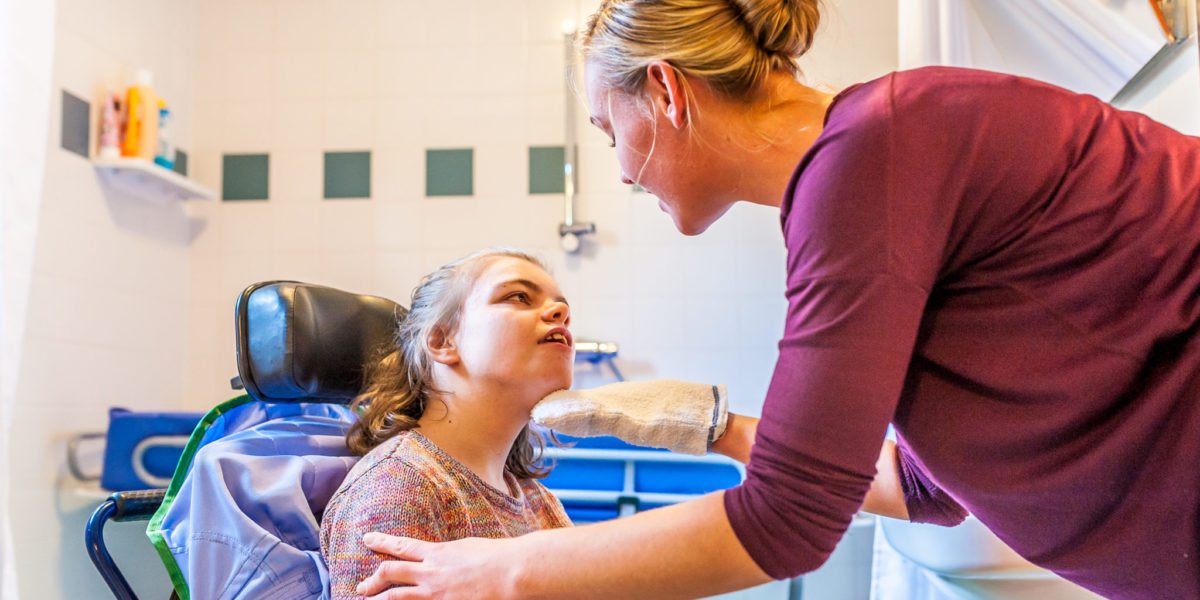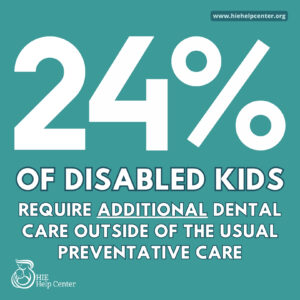 Children with hypoxic-ischemic encephalopathy (HIE) and other developmental disabilities often have dental issues due to oral aversions and difficulty performing dental-hygiene-related tasks (1).
Children with hypoxic-ischemic encephalopathy (HIE) and other developmental disabilities often have dental issues due to oral aversions and difficulty performing dental-hygiene-related tasks (1).
In fact, children with these conditions are roughly twice as likely to have unmet oral health care needs than typically developing children (2).
Disabled children are also considered at an overall higher risk for developing dental diseases (1).
Jump to:
- Why might kids with disabilities experience oral health issues?
- Detecting oral health issues
- Creating a daily preventative care routine
- Dental care specialists for kids with HIE
- Finding a dentist who can help my child
- Paying for dental care
- About the HIE Help Center and ABC Law Centers
Why might children with disabilities experience oral health issues?
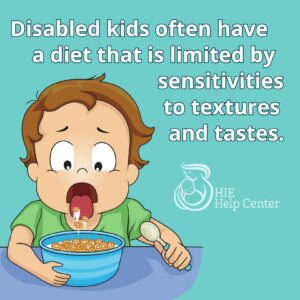 Children with disabilities are often at risk for developing dental caries (cavities) due to (1):
Children with disabilities are often at risk for developing dental caries (cavities) due to (1):
- Diet: Children with disabilities and sensory processing issues often have a diet that is limited by their sensitivities to textures and tastes. They often have a preference for carbohydrate-rich foods, or a need for liquid or puréed foods only. Because of this, they may have nutritional deficiencies that can affect oral health.
- Difficulty accessing dental care: People with disabilities often struggle to acquire dental coverage on top of their other healthcare needs. Additionally, not all dental facilities or dentists are equipped or willing to treat individuals with complex medical conditions. Reportedly, 24% of children with special health care needs required dental care outside of the usual preventive care (1). Additionally, 8.9% of parents were unable to obtain their necessary dental care (1).
- Insufficient saliva production or impaired salivary function
- Low family funds: Often children with special health care needs face high costs for health care in general, and struggle to pay for dental needs on top of that.
- Limitations in performing oral hygiene: Neuromuscular or cognitive disabilities can inhibit teeth brushing.
- Oral aversion and behavioral difficulties: Many children with disabilities do not cooperate in the dentist’s chair, or generally do not like having things in their mouths.
- Difficulty swallowing and oral motor hypotonicity
- GERD and chronic vomiting
- Medications: Use of medicine containing high sugar levels can affect oral health. Additionally, medications that treat seizures can cause gingival overgrowth.
- Maladaptive dental behaviors: Children with neurodevelopmental disabilities may experience bruxism (teeth grinding), biting on nonfood objects, or other maladaptive dental behaviors.
- Dysphagia (which can leave food in the mouth)
- Weak tongues can inhibit the cleaning of oral surfaces
- Gagging may inhibit complete brushing of the teeth
- An inability to spit may cause toothpaste swallowing.
- Malocclusion/teeth crowding (which is more common with intellectual and developmental disabilities or cerebral palsy)
- Crowding makes teeth harder to clean, increasing risk of periodontal disease and cavities.
Detecting oral health issues
Parents of children with HIE or other disabilities should watch out for (3):
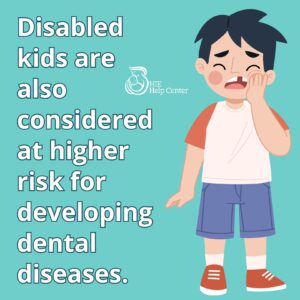 Gingival hyperplasia (gum enlargement), especially if the child is prescribed antiepileptic medications for seizures such as phenytoin, calcium channel blockers, or cyclosporin A
Gingival hyperplasia (gum enlargement), especially if the child is prescribed antiepileptic medications for seizures such as phenytoin, calcium channel blockers, or cyclosporin A- Gum redness and swelling (a sign of gingivitis, also known as gum disease)
- Periodontal disease (gum infection)
- Trauma to the head and face: This is more common in children with seizures, developmental delays, poor muscle coordination, or abnormal protective reflexes, and can damage oral structures.
- Bruxism (teeth grinding, especially during sleep or in times of stress)
- Malocclusion: ‘Bite’ misalignment, which can cause abnormal facial shape, drooling and biting/chewing difficulty
- Delayed tooth eruption: Children with developmental disabilities may get their teeth later than other children.
- Tooth decay and/or cavities (caries) due to excessive drooling (sialorrhea) or due to acid from reflux or vomiting
Creating a daily preventative care regimen
Because children with disabilities may have unique health concerns, parents should speak to a dental or other medical professional (such as an occupational or speech therapist) to see how they can tailor daily preventive care regimens to their child.
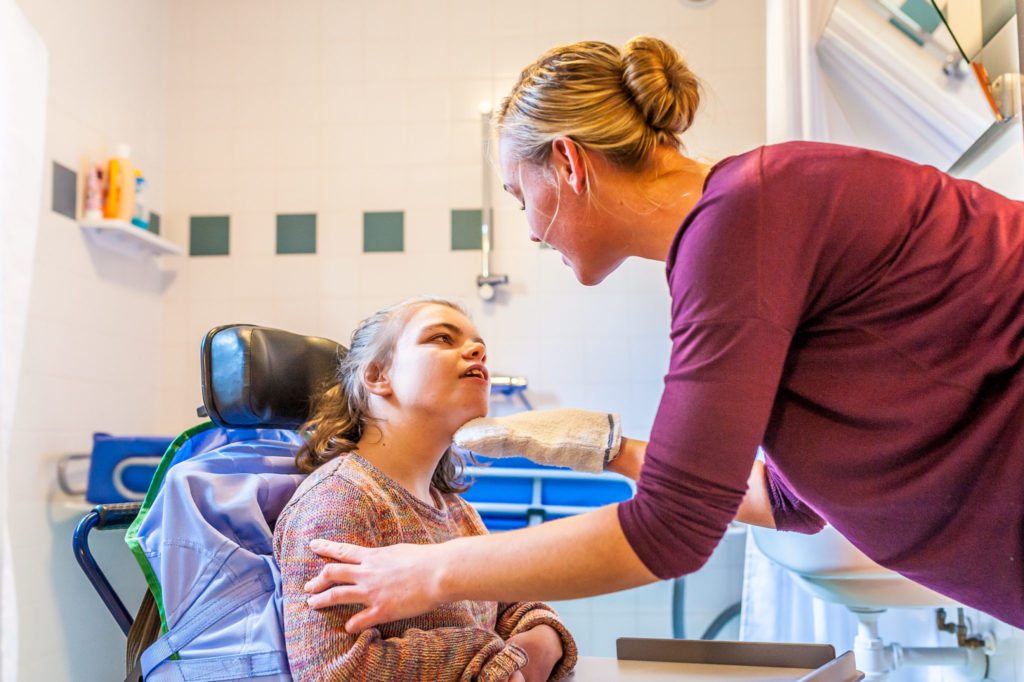 We’ve compiled a few tips for helping children with disabilities care for their teeth (3):
We’ve compiled a few tips for helping children with disabilities care for their teeth (3):
- Plan a visit with your dentist before the child goes there for their treatment. This will familiarize them with the office and the dentist before they have the procedure done.
- Brush your child’s teeth for them or find a toothbrush modification that will help your child be able to brush on their own. An example can be found here.
- Obtain aids for flossing, such as floss holders.
In some situations, it may not be possible to brush, floss, and rinse regularly throughout the day. If rinsing with water is not an option, caregivers should use a disposable applicator swab to clean the mouth, and continue scheduling regular dental appointments for cleaning, fluoride treatment, and sealants.
Dental care specialists for kids with disabilities
You should consult with your child’s physician to determine what best meets their individual needs. However, there are several dental care professionals that may help a child with special needs:
- Dentists (who provide cleaning, fillings, minor surgery, and fluoride or sealant treatment)
- Orthodontists (who treat malocclusions and improve tooth positioning)
- Periodontists (who treat infections, plaque, and gingivitis)
- Cosmetic dentists (who improve the aesthetic appearance of teeth)
Other professionals the child may see include dieticians (who can provide advice regarding meal plans that minimize tooth decay) and speech-language pathologists (SLPs), who can help a child control their facial muscles to improve chewing and swallowing ability.
How do I find a dentist that can help my child with a disability?
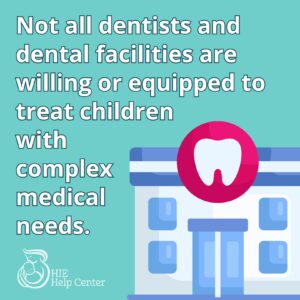 Not all dentists are well-equipped to address the unique health concerns of individuals with disabilities.
Not all dentists are well-equipped to address the unique health concerns of individuals with disabilities.
Dental practitioners with experience in serving individuals with disabilities can often be difficult to find, and there are often barriers to oral health care, including barriers to building accessibility, financial availability (due to the costliness of restorative work), and lack of insurance coverage (1).
However, there are several organizations devoted specifically to dental professionals with disability-related training, and parents can check to see if there is a dentist near them that can help keep their child’s teeth healthy:
- The Special Care Dentistry Association and SCDA Care Locator
- Dental Lifeline Network: Dedicated to helping individuals with disabilities find dental care
- Find a State Oral Health Program
- Grottoes of North American: Dental Care for Kids with Special Needs (USA)
These medical professionals have experience in addressing special healthcare needs, which can include handling breathing difficulties, reducing aspiration risk, doing wheelchair transfers, controlling seizures and acid reflux, sedation, pharmaceutical interactions, and the control of involuntary movements, shaking, and seizures – topics that do not always apply with traditional dental practice. They can also provide specific advice to caregivers regarding daily health maintenance routines.
How will I pay for dental care for my disabled child?
Some insurance plans provide dental health insurance coverage, while others do not. Most dental clinics have payment plans and dental care packages that can help families save money, but it is best to inquire about pricing prior to receiving services.
About the HIE Help Center
The HIE Help Center is run by ABC Law Centers, a medical malpractice firm exclusively handling cases involving HIE and other birth injuries since the firm’s inception in 1997.
If you suspect your child’s HIE may have been caused by medical negligence, contact us to learn more about pursuing a case. We provide free legal consultations, during which we will inform you of your legal options and answer any questions you have. Moreover, you would pay nothing throughout the entire legal process unless we obtain a favorable settlement.
You are also welcome to reach out to us with inquiries that are not related to malpractice. We cannot provide individualized medical advice, but we’re happy to track down informational resources for you.
Related Resources
To learn more about ways to help maintain your child’s oral health, please see the following resources:
- A Caregiver’s Guide to Good Oral Health for Persons with Special Needs
- Practical Oral Care for People With Cerebral Palsy
- Colgate Oral Care Center: Dental Health Care For Children With Special Needs
Sources
- Norwood, K. W., & Slayton, R. L. (2013, March 01). Oral Health Care for Children With Developmental Disabilities. Retrieved June 26, 2019, from https://pediatrics.aappublications.org/content/131/3/614
- Pleis, D. (n.d.). Dental Health for Children with Special Needs | Colgate®. Retrieved June 26, 2019, from https://www.colgate.com/en-us/oral-health/conditions/developmental-disabilities/dental-health-care-for-children-with-special-needs-0414
- Developmental Disabilities. (n.d.). Retrieved June 26, 2019, from https://www.nidcr.nih.gov/health-info/developmental-disabilities/more-info

